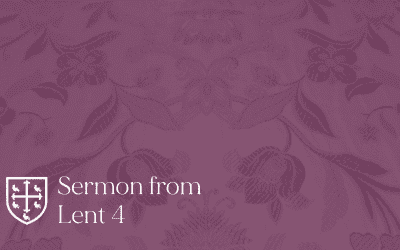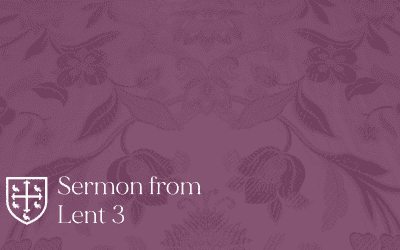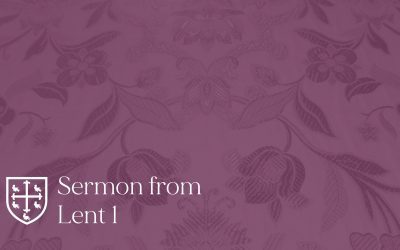Watch Here
Proper 26 Year A 11/5/2023
Micah 3.5-12; Psalm 43; 1 Thessalonians 2:9-13; Matthew 23:1-12
Rev. Mark A. Lafler
We are halfway through our lectionary journey through St. Paul’s first letter to the Thessalonians.
Just like last week, our reading today comes from the 2nd chapter of 1 Thessalonians.
And our focus verse today will be on the last verse of our reading…
Verse 13, which says:
And we also thank God continually because,
when you received the word of God,
which you heard from us,
you accepted it not as a human word,
but as it actually is, the word of God,
which is indeed at work in you who believe.
What Paul writes here is an unambiguous assertion…
He is saying that the gospel that he, St. Paul, preached was the word of God.
Just like the prophets in the Old Testament who proclaimed their message, their words were from God…
Old Testament prophets often began their prophetic oracles with statements like:
The word of the Lord came to me…
Or thus says the Lord…
We just heard a prophet declare this in our reading from Micah:
Thus says the Lord concerning the prophets… (v. 5)
Paul is making the same assertion…
…the word of God,
which you heard from us,
…it actually is,
the word of God…
And Paul commends the Thessalonians for understanding the message he preached as the word of God.
He doesn’t rebuke them for taking his words too highly.
Clearly, St. Paul is self-conscious of his apostolic authority.
As Rev. John Stott wrote:
He knew who he was (an apostle of Christ)
and he knew what his message was (the word of God).[1]
I want to use this verse as a springboard to talk about what the Church teaches about God’s Holy Word.
In this world where many seem to think that all opinions are just as valid as any other opinion…
we can thank the information and technology age for that…
Often the struggle our society has with information boils down to the muddle of just that: which opinion, source, or message is more valid than another.
This same tangle of information happens in the Christian world…
And especially regarding the way people understand the scriptures.
Some of this can be heard with comments like:
The Old Testament God seems to be about judgment and wrath whereas the New Testament God is about love and forgiveness…
how can they possibly be the same God?
I like the message of love that Jesus speaks of, but that St. Paul seems to be a bit judgmental.
I think there is a hierarchy of scripture… obviously the Gospels are most important, then the rest of the New Testament, and then the Old Testament.
These are popular ideas… and they are given wings on social media.
Nevertheless, all of these are poor readings of the Holy Scriptures and/or misunderstandings of Christian doctrine.
Today we will reflect on our understanding of God’s Holy Word…
Our belief and theology of the Bible…
Especially as it is expressed in The Episcopal Church.
What we think about the Holy Scriptures will impact the way we interact with God’s Holy Scriptures.
The first obvious place to go about what we believe about the Holy Scriptures is our Catechism.
Our Catechism is found in the Book of Common Prayer and is a series of questions and answers that are arranged under 18 themes.
One of those themes is The Holy Scriptures and begins on page 853.
The first question is this:
- What are the Holy Scriptures?
- The Holy Scriptures, commonly called the Bible,
are the books of the Old and New Testaments…
Do note that the answer lists the Old and New Testaments…
It makes no mention of particular books or authors.
(It does mention the apocrypha, but that is for another talk)
It just plainly lists both the Old and New Testament as The Holy Scriptures.
It then asks about the Old Testament:
- What is the Old Testament?
- The Old Testament consists of books written by the
people of the Old Covenant,
under the inspiration of the Holy Spirit,
to show God at work in nature and history.
Next it asks:
- What is the New Testament?
- The New Testament consists of books written by the
people of the New Covenant,
under the inspiration of the Holy Spirit,
to set forth the life and teachings of Jesus
and to proclaim the Good News of the Kingdom for all people.
There are two common threads here:
Both the Old and the New Testaments were written by people.
Both were under the inspiration of the Holy Spirit.
Not just one testament or the other… both.
So, why do we call the Holy Scriptures the Word of God?
The catechism says:
We call them the Word of God because God inspired their human authors and because God still speaks to us through the Bible.
God speaks to us through both the Old and the New Testament… through all of the authors of the Bible…
Because he inspired them by the power of the Holy Spirit.
Just like St. Paul was asserting in our reading today.
And it is through the Holy Spirit that we understand the meaning of the Bible…
And the Holy Spirit guides the Church in the true interpretation of the Scriptures.
As the Catechism instructs us.
Another way of seeing what our church teaches regarding God’s Holy Word is through the solemn declaration that ordained ministers make.
In the ordination of Deacons, Priests, and Bishops…
all of these offices require this declaration:
…I solemnly declare that I do believe the Holy Scriptures of the Old and New Testaments to be the Word of God,
and to contain all things necessary to salvation…
(See BCP 513, 526, and 538)
Here we have a declaration by oath that there is belief of the Old and New Testament to be the Word of God.
There is also a statement that in the Word of God is contained all things necessary to salvation.
So, in our church, we believe that all things necessary to salvation are in God’s Holy Writ.
There are plenty of things that contain truth outside of God’s Word…
For all truth (real truth) is God’s truth…
But specifically, regarding salvation, the Bible contains all things necessary.
Nothing needs to be added to the Bible regarding salvation.
Finally, one other place we can go to for our Episcopal and Anglican understanding of the Bible…
Its importance…
And its formation in our life…
Is found in our prayers.
Anglican theology is primarily expressed in our prayers.
This is why the central book outside of the Bible in our tradition is the Book of Common Prayer.
And something like 80% of the Book of Common Prayer is quotes and phrases from the Scriptures.
Rev. J. I. Packer has stated that the Book of Common Prayer is the Bible rearranged for the purpose of worship and prayer.
Because of this our theology is primarily expressed through prayer… that is in the Book of Common Prayer.
Every Sunday we have a collect (it usually follows the Gloria)…
Each Sunday of the church year has a different collect…
A Collect is a short prayer focusing on a single theme before a “collection” of people.
Today our collect is called Proper 26.
In two weeks, we will have the collect of Proper 28.
Although, you will hear it again in two weeks…
I want to pray it now because it expresses once again our theology and belief about Holy Scripture and our use of the Bible.
Proper 28 (BCP, 236)
Blessed Lord,
who caused all holy Scriptures to be written for our learning:
Grant us so to hear them, read, mark, learn, and inwardly digest them, that we may embrace and ever hold fast the blessed hope of everlasting life, which you have given us in our Savior Jesus Christ;
who lives and reigns with you and the Holy Spirit, one God, for ever and ever. Amen.
Our prayer-full theology expresses and teaches us here that we are to hear God’s Holy Word and we are to read, mark, learn and inwardly digest them.
So not only do we believe that all 66 books of the Bible are the inspired Word of God we also believe that we should read and study all of them.
So, I commend to you two life patterns…
I pray you do what our prayer says we should do with Holy Writ.
Number one: I commend you to hear, read, mark, learn, and inwardly digest the Holy Scriptures in private reading and study.
The golden Anglican standard for this is the Daily Office (see me later and I can show you this in the Book of Common Prayer)…
But the daily reading of scriptures is the expectation.
That doesn’t mean there is not grace if you fail to read it daily…
God’s grace is always ready to meet us if we fall short…
But daily reading is what we are after…
The saturation and digestion of the Holy Scriptures.
A daily habit of reading and studying God’s Word will deepen your relationship with Jesus Christ…
and if you accompany that with prayer…
Look out!
I do not think one can have regrets when one is truly spending time with the Almighty God.
So daily private reading and study of God’s Holy Words.
Number two: I commend you to hear, read, mark, learn, and inwardly digest the Holy Scriptures in communal reading and study.
There is something about interacting with God’s Word in the Christian Community…
In the Church…
With God’s people.
Not only does it push against the overly individualism of our day…
It helps feed a need to be planted with God’s people.
Sunday is the obvious time for this…
But here at St. Edward’s there are many more opportunities to engage with the Holy Scriptures in community.
There are Men’s groups…
Women’s groups…
Youth groups…
You have R&R on Tuesdays (next Tuesday)…
You have Evening Prayer and Worship on Wednesdays…
You have ABC on Thursdays…
Find a group to grow in…
To belong to…
To practice the prayer:
Grant us so to hear the Holy Scriptures to read, mark, learn, and inwardly digest them.
Our Lord Jesus wants to speak to you…
And he has spoken to you…
Through the Holy Scriptures…
Open them…
Read them…
Ask about them…
And listen to what God is saying to you in them.
Amen.
[1] John R. W. Stott, The Message of 1 & 2 Thessalonians Downers Grove: IVP, 1991), 55.




